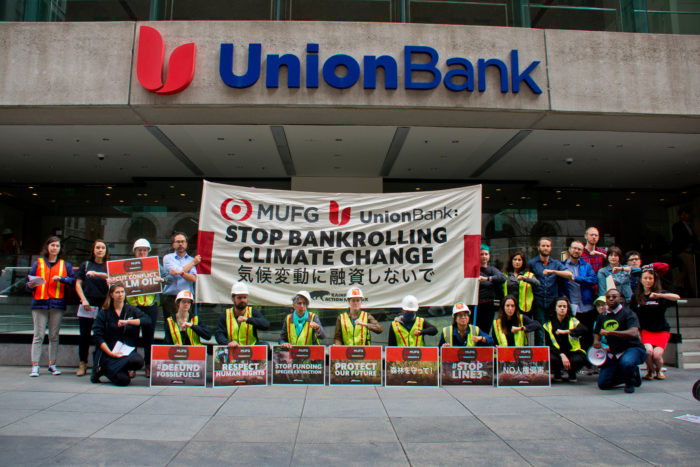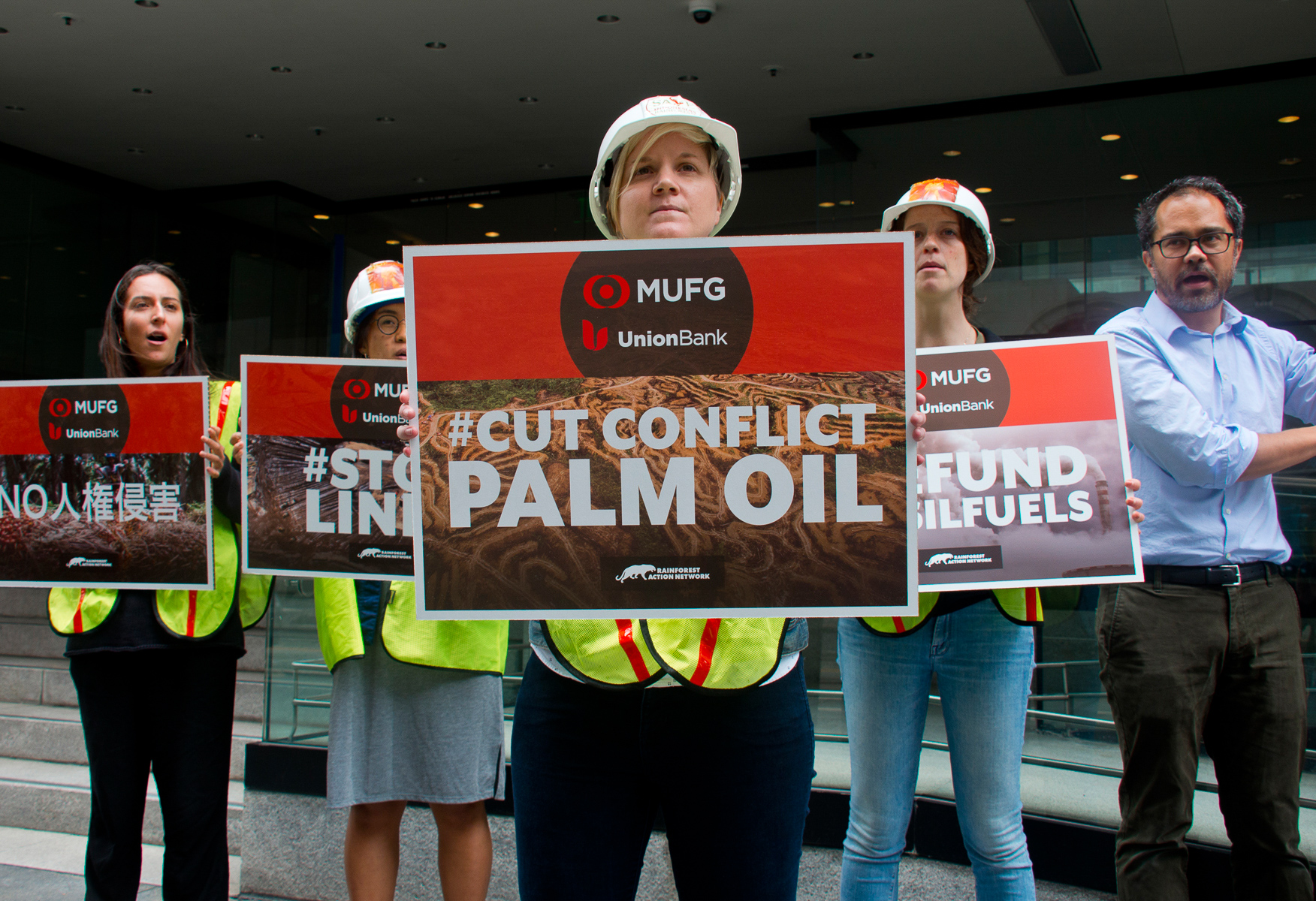Big banks don’t care how their investments might impact people and the planet — as long as their cash cow keeps on giving.
The world’s major banks move billions of dollars every single hour. They invest their — your — money in industries that maximize profit.
You probably know about banks investing in the fossil fuel industry, but most people are less familiar with the role they play in bankrolling forest destruction. The world’s worst forest destroyers — the beef, soy, pulp and paper, palm oil and cocoa industries — can only operate as long as the cash continues to flow from banks. So we’re following the money to connect banks directly to the destruction they’ve caused.
RAN exposes the money trail.

We’re targeting some of the most influential banks in the world, to change their policies and practices toward deforestation, fossil fuels and human rights.
Some of the most prestigious and well-known banks are funding the (usually illegal!) clear-cutting of our world’s last rainforests, and with your help, we can stop them.
But exposing banks is tougher than exposing big brands, because they operate behind the scenes and out of the public eye. RAN’s team is made up of some of the best researchers, analysts, and campaigners who dig into the tremendous amount of data, compile the numbers and graphs, and stay in touch with the world of financiers and investors. They’re literally experts when it comes to “following the money” and have created a massive database where we can pinpoint exactly how much money each bank has spent on what kind of forest-risk commodity.
That might sound very technical, but it’s the foundation of the crucial campaign work we do: which is to defund deforestation. There’s nowhere for bank executives to hide anymore.
Banks are using our money to finance and invest in the destruction.
The largest bank in Japan, MUFG — the world’s fifth largest bank — is also one of the biggest financiers of Conflict Palm Oil and pulp and paper in Indonesia. In just the two years between 2017 and 2019, it poured nearly a billion USD into palm oil businesses, many of them linked with illegal rainforest clearing and human rights abuses.
Thanks to you, we’ve sent thousands of petitions and letters to executives in the U.S. and Japan, and we’ve held countless meetings with MUFG to negotiate and push the bank to adopt a No Deforestation, No Peatlant, No Exploitation (NDPE) policy. And it’s working! Over the past two years, MUFG made good progress by adopting and strengthening its financing policies. And in 2020, one of MUFG’s competitors, Mizuho FG, made a big commitment toward fossil fuel divestment and no-deforestation practices. In Japan, peer pressure is key, and we can already see the ripple effect happening.
Japanese banks are often key financiers for both fossil fuel projects and forest-risk commodities like Conflict Palm Oil in Southeast Asia. RAN will keep up the pressure through the coming years until the last Japanese megabank has committed to put people and planet first. Tell MUFG to keep our forests standing!
JP Morgan Chase: Climate & Forest Killer
JP Morgan Chase is the largest bank in the U.S. and the sixth largest in the world. It’s also the world’s worst when it comes to fossil fuel financing. In 2019 alone, Chase poured $69 billion into oil drilling, tar sands and pipeline projects — including the Keystone XL Pipeline.But just like MUFG, Chase is putting hundreds of millions of dirty dollars into the deforestation business too, including massive cattle ranches in the Amazon. Industrial agribusiness means big profits for a bank like Chase: Our investigations have shown that since the Paris Climate Agreement in 2016, Chase financed half a billion dollars into cattle ranches directly linked to illegal deforestation in the Amazon.
We can’t allow banks like Chase and MUFG to earn short term profits at the world’s expense.
And we need to keep forests standing so that they continue to provide us all with the air we breathe and the water we drink. Our world’s forests and climate don’t belong to banks and they’re not for sale. It’s time to fight for our future and end the profits from destruction.
We’re demanding banks:
- Adopt and implement “No Deforestation, No Peatland, No Exploitation” (NDPE) policies across all investments and financial services when financing forest-risk commodities such as pulp and palm oil;
- Prohibit use of fire to clear land, except for traditional ecological practices;
- Make sure all financing is aligned with the Paris Agreement goal of limiting global warming to 1.5°C;
- Fully respect all human rights, particularly workers’ rights and the rights of Indigenous Peoples, and show zero tolerance towards land grabs and violence; and
- Know and publicly disclose the footprint of investments or financial services impacting forests, peatlands and the rights of Indigenous Peoples and communities affected by logging and the expansion of industrial agriculture.
(See our full demand set here)
We need just, transformational change across all systems of modern life. And as consumers, we have the ability to change industry practices — and that goes for banks as well as for brands. We have the power to hold banks and other companies accountable for their actions.
We can hold them to their promises and make sure that they eradicate deforestation and address human rights abuses in their supply chains and financing. By harnessing our collective power, RAN and our allies have run successful campaigns against corporations for over 30 years — and we will continue to do so.












